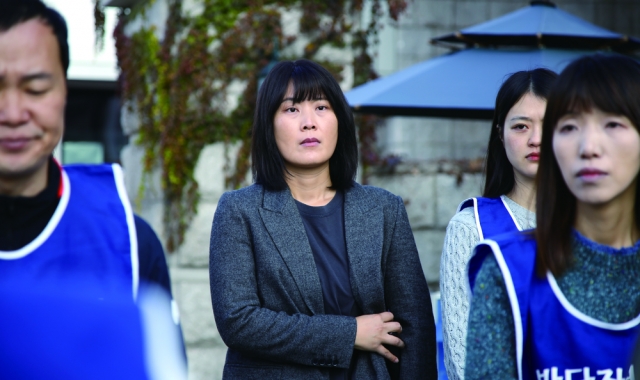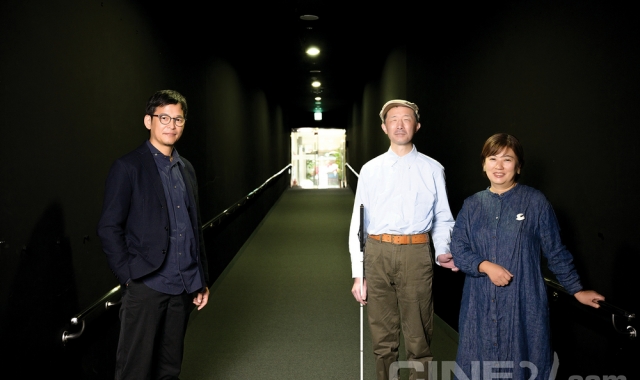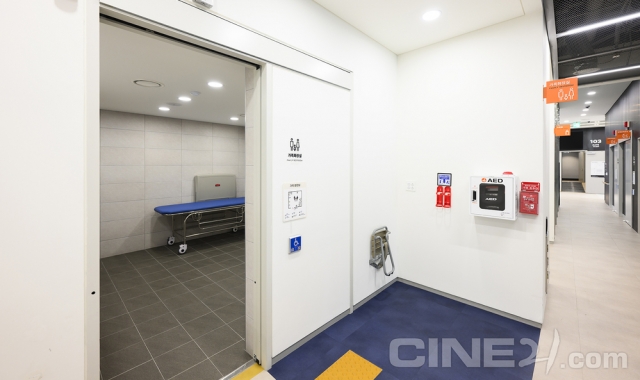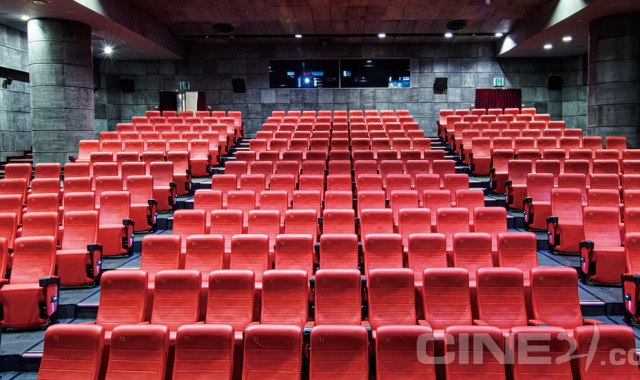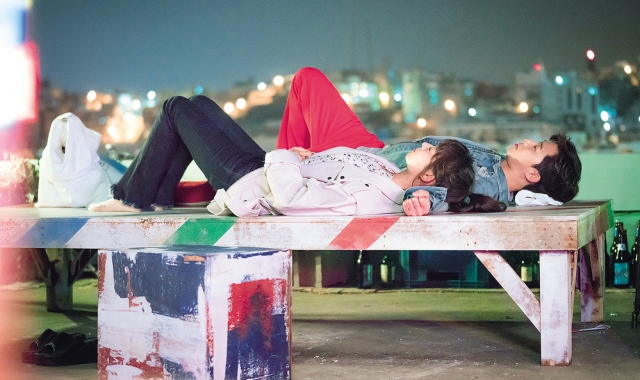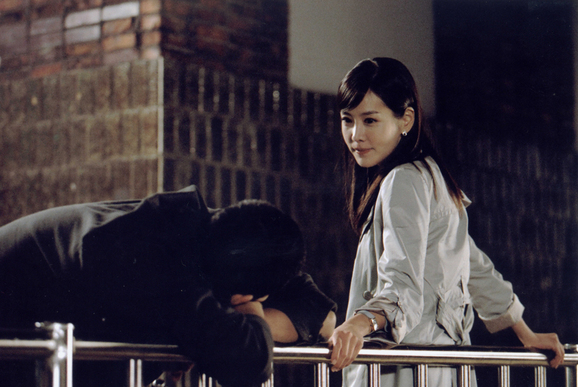
올해 이탈리아의 우디네극동아시아영화제 관객상은 박광현 감독이 참석한 가운데 유럽 프리미어로 상영된 <웰컴 투 동막골>에 돌아갔다. 영화는 상영 중에는 마을 사람들과 군인들에게 마법처럼 내린 팝콘비 장면에서 즉흥적으로 박수가 터져나왔으며, 또한 폐막제에 참석한 1300명이나 되는 관객에게 기립박수를 받았다. 영화제의 5만명 관객의 투표하에 뽑힌 차점작은 두편의 일본영화, 야마자키 다카시의 <올웨이즈 3초메의 석양>(Always Sunset on Third Street)과 배두나가 출연한 야마시타 노부히로의 <린다 린다 린다>였다. 두 감독 모두 행사에 참가했다. 영화제에서 가장 강렬했던 영화는 한국, 일본 그리고 놀랍게도, 수준있는 상업영화의 컴백을 알리는 새로운 작품으로 인터내셔널 프리미어를 이끈 타이영화였다.
이 영화제는 매해 특정 아시아 국가에서 온 영화들을 확보하는 데 각기 다른 도전을 경험하게 된다. 지난해에 타이 영화업계는 국제적으로 알리고 싶은 이미지에 대한 집단 합의사항을 갖고 있는 듯했다. 올해 도전은 새로운 세대의 제작자와 투자자들이 국제시장에 발을 디디기 시작한 중국 본토로부터 왔다. 본국 극장 매출 성공이나 해외 세일즈의 기회가 거의 없는 상황에서 그들은 베를린, 칸, 베니스의 레드 카펫을 밟아 인정받기를 원한다. 그러나 3대 영화제가 더이상 협조해주지 않았다. 올해 칸은 경쟁부문에 아시아영화를 단 한편만 골랐다. 성적으로 노골적인 중국 본토 영화인데 본국의 검열관으로부터 허가를 기다리고 있는 형편이어서 그 출품도 여전히 불확실하다. 그러면서 칸에서 아시아 장르영화들은 심야상영으로 밀려났다. 프랑스에서 여전히 영향력있는 고연령대 세대의 비평가들이 거부하면서, <올드보이>나 <흑사회>가 칸 경쟁에 올랐던 것과 같은 일은 이제 끝난 것처럼 보인다.
올해 극동아시아영화제는 <연애의 목적> <내 생애 가장 아름다운 일주일> <너는 내 운명>과 같은 지난해 최고의 한국영화 중 몇편의 유럽 프리미어를 확보하는 데 성공했다. 이 영화들은 모두 명망 높은 베를린의 파노라마 섹션에 들어갈 만했다. 그리고 몇년 전이었다면 그렇게 됐을 것이다. 그러나 현재의 프로그래밍팀이 2002년에 새로 구성될 때만 해도 너무나 활기 넘쳤던 베를린영화제는 이제 로테르담이나 선댄스 등의 보수적인 인디영화를 지향하는 영화제들과 구별되지 않게 됐다.
한국영화 중 극동아시아영화제가 올해 확보하지 못한 영화는 <러브레터>(1995)가 만들어낸 장르를 흥미롭게 전복한 정지우 감독의 <사랑니>였다(올해 영화제의 다른 두 영화, 타이의 <친한 친구>(Dear Dakanda)와 일본의 <나나>도 그들에게 큰 영향을 끼친 이와이 순지의 영화에 경의를 보내고 있다. 이 밖에 자신만의 집착을 갖고 만든 최근의 영화로는 홍콩의 <아수>와 싱가포르의 <러브 스토리>가 있다). 받게 될지 안 될지는 모르지만, <사랑니>는 마땅한 큰 영화제 프리미어를 받기 위해 기다리고 있는 상황이다.
세계 3대 영화제 중 하나에는 당연히 갈 수 있을 거라고 예상되는 “세계적인 대가”로 간주될 만한 아시아 감독들은 20명 정도 될 것이다. 카를로비 바리, 로카르노, 산세바스티안과 같이 덜 중요하지만 여전히 명망있는 영화제들이 자리를 벗어나지 못하도록 베를린, 칸, 베니스가 그 감독들의 상대적으로 별볼일 없는 영화들조차 나눠 가져야만 한다는 음모이론을 떠올린다. 그런 식으로 선정작을 뽑다 보면 신인감독이 들어갈 자리는 얼마 안 남게 되는 것이다. 특히 베를린과 칸이 제구실을 다하고 있지 않고 있을 때 말이다.
The audience award at the Far East Film Festival in Udine, Italy, this year went to Welcome to Dongmakgol, receiving its European premiere with director Park Kwang-hyun in attendance. The film received a standing ovation from its 1300-strong audience as the event's closing gala, with spontaneous applause mid-movie when popcorn magically rained down on the film's villagers and soldiers.
The runner-up prizes, as voted by the festival's 50,000 audience members, went to two Japanese films, Yamazaki Takashi's Always: Sunset on Third Street and Yamashita Nobuhiro's Linda Linda Linda starring Bae Doona. Both directors were in attendance during the event. The strongest films at the festival came from South Korea, Japan and, surprisingly, Thailand with international premieres of several new titles that mark a comeback of quality commercial cinema from the royal kingdom.
Every year the festival goes through different challenges in securing films from specific Asian countries. Last year it seemed that Thailand's film industry had a collective agenda for the image it wanted to present internationally. This year, the challenge was mainland China as a new generation of producers and investors tip their toes into the international market. With little chance of either box office success at home or overseas sales, they want validation on the red carpets of Berlin, Cannes or Venice.
But the big three festivals aren't playing ball any more. This year's Cannes has just one Asian film in competition, a mainland China feature whose inclusion remains uncertain while the sexually explicit film awaits clearance from the home censors. Meanwhile, Asian genre films at Cannes are tucked away in midnight slots. The days of Old Boy or Election in competition at Cannes seem to be over, having been rejected by an older generation of critics that are still influential in France.
Far East Film this year managed to secure European premieres of several of the best Korean films of last year, including Rules of Dating, All for Love and You are My Sunshine. Each of these films deserved prestigious Panorama slots at Berlin and just a few years ago might have received them. But the German festival that was so vibrant when its current programming team debuted in 2002 is now indistinguishable from Rotterdam and Sundance and their conservative indie orientation.
Among the Korean movies that Far East Film was unable to secure this year was Blossom Again, Jung Ji-woo's exciting subversion of a genre created by Love Letter in 1995. (Two other films at this year's festival, Thailand's Dear Dakanda and Japan's Nana, also pay homage to Iwai Shunji's influential film. Other recent movies with their own fixation include Hong Kong's Mob Sister and Singapore's Love Story.) Blossom Again is hanging on for the festival premiere it deserves, which it may or may not receive.
There are perhaps two dozen active Asian directors that can be considered "world masters" who take a prestigious slot at one of the big three festivals for granted. I have a conspiracy theory that even their weaker films have to be shared between Berlin, Cannes or Venice so as to keep the less important but still prestigious festivals in Karlovy Vary, Locarno and San Sebastian in their place. That doesn't leave much space for newcomers, especially when Berlin and Cannes aren't pulling their weight.
[Disclaimer: Stephen Cremin heads the consulting team for the Far East Film Festival in Udine, Italy]

